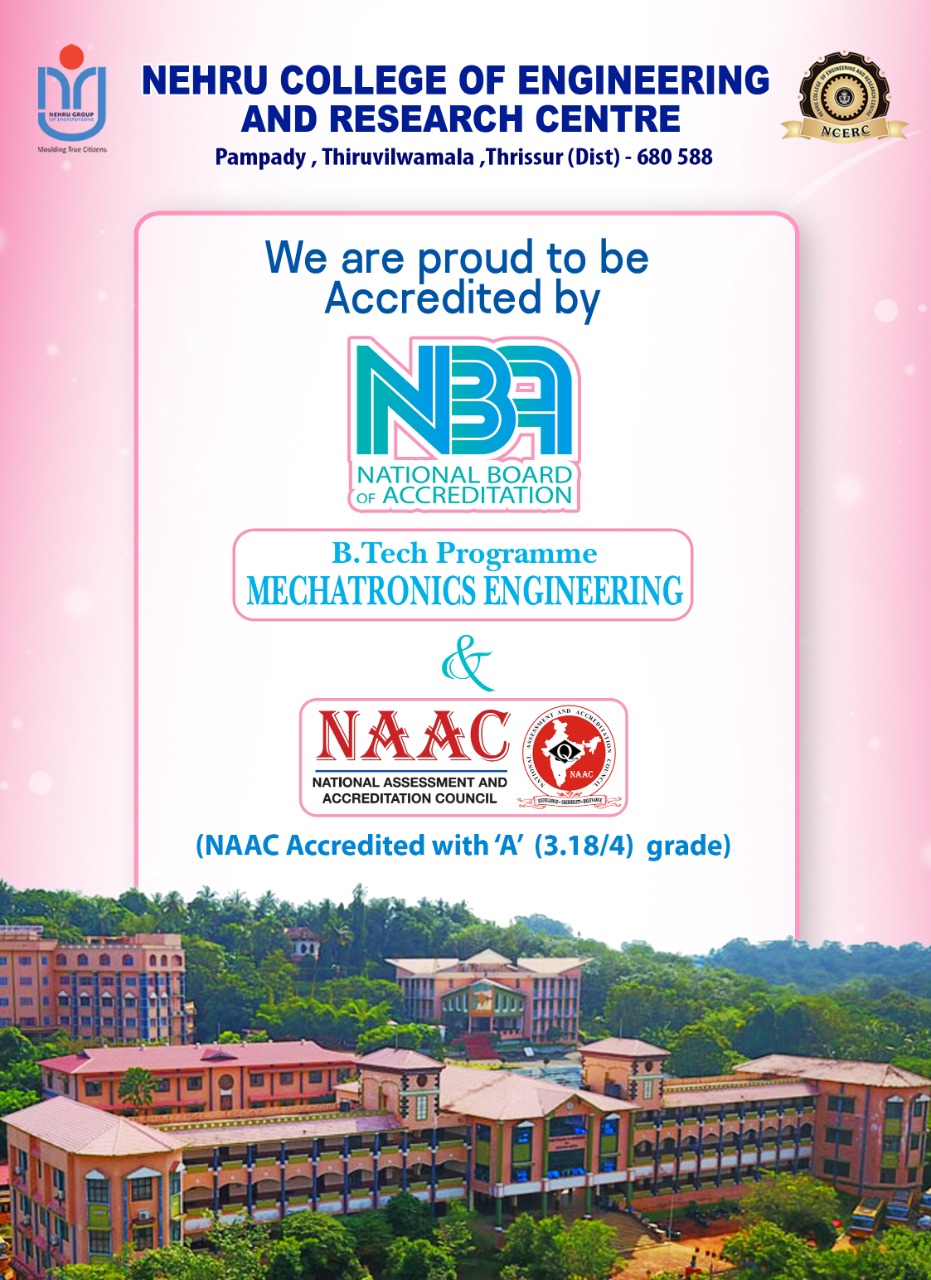About
NCERC is the first institution offered the Mechatronics Engineering since 2013 (Approved by AICTE New Delhi and Re-Accredited by NAAC and Affiliated to the University of A P J Abdul Kalam Technological University). Mechatronics engineering programme is accredited by NBA and department provides a platform to create and apply knowledge by thinking and doing in this rapidly changing world. We aim to provide our students with a perfect blend of intellectual and practical experiences that helps them to be a King of industrial automation.
VISION
To develop professionally ethical and socially responsible Mechatronics engineers to serve the humanity through quality professional education.
MISSION
- MD 1: The department is committed to impart the right blend of knowledge and quality education to create professionally ethical and socially responsible graduates.
- MD 2: The department is committed to impart the awareness to meet the current challenges in technology.
- MD 3: Establish state-of-the-art laboratories to promote practical knowledge of mechatronics to meet the needs of the society.
PROGRAM EDUCATIONAL OBJECTIVES (PEO’S)
- PEO 1: Graduates shall have the ability to work in multidisciplinary environment with good professional and commitment.
- PEO 2: Graduates shall have the ability to solve the complex engineering problems by applying electrical, mechanical, electronics and computer knowledge and engage in lifelong learning in their profession.
- PEO 3: Graduates shall have the ability to lead and contribute in a team with entrepreneur skills, professional, social and ethical responsibilities.
- PEO 4: Graduates shall have ability to acquire scientific and engineering fundamentals necessary for higher studies and research.
PROGRAM OUTCOMES (PO’S)
Engineering Graduates will be able to:
- PO 1. Engineering knowledge: Apply the knowledge of mathematics, science, engineering fundamentals, and an engineering specialization to the solution of complex engineering problems.
- PO 2. Problem analysis: Identify, formulate, review research literature, and analyze complex engineering problems reaching substantiated conclusions using first principles of mathematics, natural sciences, and engineering sciences.
- PO 3. Design/development of solutions: Design solutions for complex engineering problems and design system components or processes that meet the specified needs with appropriate consideration for the public health and safety, and the cultural, societal, and environmental considerations.
- PO 4. Conduct investigations of complex problems: Use research-based knowledge and research methods including design of experiments, analysis and interpretation of data, and synthesis of the information to provide valid conclusions.
- PO 5. Modern tool usage: Create, select, and apply appropriate techniques, resources, and modern engineering and IT tools including prediction and modeling to complex engineering activities with an understanding of the limitations.
- PO 6. The engineer and society: Apply reasoning informed by the contextual knowledge to assess societal, health, safety, legal and cultural issues and the consequent responsibilities relevant to the professional engineering practice.
- PO 7. Environment and sustainability: Understand the impact of the professional engineering solutions in societal and environmental contexts, and demonstrate the knowledge of, and need for sustainable development.
- PO 8. Ethics: Apply ethical principles and commit to professional ethics and responsibilities and norms of the engineering practice.
- PO 9. Individual and team work: Function effectively as an individual, and as a member or leader in diverse teams, and in multidisciplinary settings.
- PO 10. Communication: Communicate effectively on complex engineering activities with the engineering community and with society at large, such as, being able to comprehend and write effective reports and design documentation, make effective presentations, and give and receive clear instructions.
- PO 11. Project management and finance: Demonstrate knowledge and understanding of the engineering and management principles and apply these to one’s own work, as a member and leader in a team, to manage projects and in multidisciplinary environments.
- PO 12. Life-long learning: Recognize the need for, and have the preparation and ability to engage in independent and life-long learning in the broadest context of technological change.
PROGRAM SPECIFIC OUTCOMES (PSO’S)
- PSO 1: Design and develop Mechatronics systems to solve the complex engineering problem by integrating electronics, mechanical and control systems.
- PSO 2: Apply the engineering knowledge to conduct investigations of complex engineering problem related to instrumentation, control, automation, robotics and provide solutions.
